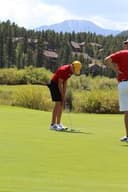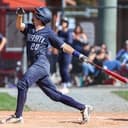
 2020 CO State Cha...
2020 CO State Cha...In the fifth grade, I didn't know how to swim. Where most swimmers my age were perfecting their stroke and getting faster, I was learning how to doggy paddle. However, by the end of the year I had substantial growth in both stroke and speed. In fact, one of the coaches of the age groups that trained at the same facility that I was learning at had approached me and asked if I wanted to join the swim team. Without giving much thought, I accepted their offer and joined the team at the beginning of the SCY season in our sixth grade.
The kids in my group were my age, but the level they swam at was far beyond what I could do at that time. Their speed and experience greatly outmatched my own, but nonetheless I trained with an unyielding firm resolve to catch up to my peers and beat them. The next three years was a period of more growth, thanks to a mixture of both intense training and learning. With the help of my coaches, I was able to quickly find flaws within my stroke. Alongside the team's and my own strength training, I had experienced the same growth in a 3 year period that my teammates had worked for in 9. Thanks to my strong commitment and desire to grow, I had achieved a level of swimming where I could compete in high level championships (e.g. the Junior Olympics). But my growth didn't stop there.
Entering the high school setting, I faced both an extremely competitive academic setting as well as in the pool. My desire to grow combined with my commitment greatly helped in both: If I failed a test, I would study over my mistakes and review on the material I was weak on so that next time, I would pass with flying colors. If I gained time at a meet, I would consult my coaches and note any mistakes or areas of improvement in my stroke that I could work on.
However, in January 2018, my family and I moved to a different state. We couldn't find a team at first, nor any pools. I had spent 2 1/2 months without any training. When we had found a team, the first day into practice I had realized to my dismay that the hard work I strove for those past years had gone. But my strong level of resolve and commitment were my saving grace, as I pushed myself to work even harder than I had before. Knowing that I couldn't solely rely on my coaches to point out flaws at meets or mid-practice anymore, I looked to myself to consciously look for any flaws within my stroke. Recently, I had noticed that I'm opening up too early on my flip turns and took the steps to improve that flaw. Balancing swimming alongside my strenuous academic life of multiple AP and Honors classes, I regained my technique, strength, and speed faster than what I initially had before I moved.
I want to join a school where I can pursue a career in the medical field as a doctor, while also having the privilege to swim for that school on the national level. This sport helps bring the best out of me, and I believe that with my commitment to both my academics and swimming alongside my positive attitude and desire to grow, I would keep on improving as both a student and an athlete.







